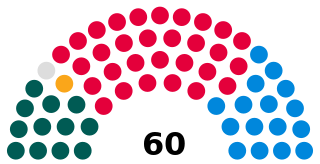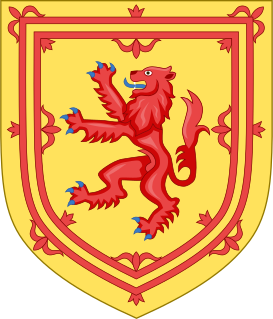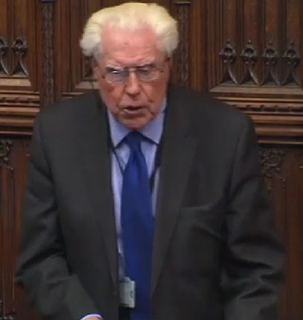
The Scottish Parliament is the devolved, unicameral legislature of Scotland. Located in the Holyrood area of the capital city, Edinburgh, it is frequently referred to by the metonym Holyrood. The Parliament is a democratically elected body comprising 129 members known as Members of the Scottish Parliament (MSPs), elected for five-year terms under the additional member system: 73 MSPs represent individual geographical constituencies elected by the plurality (first-past-the-post) system, while a further 56 are returned as list members from eight additional member regions. Each region elects seven party-list MSPs. Each region elects 15 to 17 MSPs in total. The most recent general election to the Parliament was held on 6 May 2021, with the Scottish National Party winning a plurality.

The West Lothian question, also known as the English question, is a political issue in the United Kingdom. It concerns the question of whether MPs from Northern Ireland, Scotland and Wales who sit in the House of Commons should be able to vote on matters that affect only England, while MPs from England are unable to vote on matters that have been devolved to the Northern Ireland Assembly, the Scottish Parliament and the Senedd. The term West Lothian question was coined by Enoch Powell MP in 1977 after Tam Dalyell, the Labour MP for the Scottish constituency of West Lothian, raised the matter repeatedly in House of Commons debates on devolution.

Scottish independence is the political movement for Scotland to become a sovereign state, independent from the United Kingdom.

The Senedd, officially known as the Welsh Parliament in English and Senedd Cymru in Welsh, is the devolved, unicameral legislature of Wales. A democratically elected body, it makes laws for Wales, agrees certain taxes and scrutinises the Welsh Government. It is a bilingual institution, with both Welsh and English being the official languages of its business. From its creation in May 1999 until May 2020, the Senedd was known as the National Assembly for Wales.

The Scottish Government is the devolved government of Scotland. It was formed in 1999 as the Scottish Executive following the 1997 referendum on Scottish devolution.

The first minister of Scotland is the leader of the Scottish Government and keeper of the Great Seal of Scotland. The first minister chairs the Scottish Cabinet and is primarily responsible for the formulation, development and presentation of Scottish Government policy. Additional functions of the first minister include promoting and representing Scotland in an official capacity, at home and abroad.

Sir Antony Brian Baldry, is a British Conservative Party politician who was the Member of Parliament (MP) for Banbury from 1983 to 2015.

The High Court of Justiciary is the supreme criminal court in Scotland. The High Court is both a trial court and a court of appeal. As a trial court, the High Court sits on circuit at Parliament House or in the adjacent former Sheriff Court building in the Old Town in Edinburgh, or in dedicated buildings in Glasgow and Aberdeen. The High Court sometimes sits in various smaller towns in Scotland, where it uses the local sheriff court building. As an appeal court, the High Court sits only in Edinburgh. On one occasion the High Court of Justiciary sat outside Scotland, at Zeist in the Netherlands during the Pan Am Flight 103 bombing trial, as the Scottish Court in the Netherlands. At Zeist the High Court sat both as a trial court, and an appeal court for the initial appeal by Abdelbaset al-Megrahi.

Henry Baird McLeish is a Scottish politician, author and academic who served as First Minister of Scotland and Leader of the Labour Party in Scotland from 2000 to 2001. He was Member of Parliament (MP) for Central Fife from 1987 to 2001 and Member of the Scottish Parliament (MSP) for the equivalent seat from 1999 to 2003.

James Robert Wallace, Baron Wallace of Tankerness, is a Scottish politician serving as a Non-Affiliated life peer in the British House of Lords since 2007 and Moderator of the General Assembly of the Church of Scotland since 2021. He served as the Deputy First Minister of Scotland from 1999 to 2005, and during that time he served twice as acting First Minister, in 2000, in the aftermath of Donald Dewar's death and in 2001, following Henry McLeish's resignation. He was formerly Leader of the Scottish Liberal Democrats from 1992 to 2005 and Liberal Democrats in the House of Lords from 2013 to 2016.

Her Majesty's Advocate, known as the Lord Advocate, is the chief legal officer of the Scottish Government and the Crown in Scotland for both civil and criminal matters that fall within the devolved powers of the Scottish Parliament. They are the chief public prosecutor for Scotland and all prosecutions on indictment are conducted by the Crown Office and Procurator Fiscal Service, nominally in the Lord Advocate's name.
Robert Haldane Smith, Baron Smith of Kelvin, is a British businessman and former Governor of the British Broadcasting Corporation. Smith was knighted in 1999, appointed to the House of Lords as an independent crossbench peer in 2008, and appointed Knight of the Thistle in the 2014 New Year Honours. He was also appointed to the Order of the Companions of Honour in 2016.

Dame Elish Frances Angiolini is a Scottish lawyer. She was the Lord Advocate of Scotland from 2006 until 2011, having previously been Solicitor General since 2001. She was the first woman, the first Procurator Fiscal, and the first solicitor to hold either post. Since September 2012, Angiolini is the Principal of St Hugh's College, Oxford. She is a Pro-Vice-Chancellor of the University of Oxford and Chancellor of University of the West of Scotland. Since leaving office she has led several investigations and inquiries, including a review of deaths in police custody commissioned by the then-Home Secretary Theresa May.

English votes for English laws (EVEL) was a set of procedures of the House of Commons of the Parliament of the United Kingdom whereby legislation that affected only England required the support of a majority of MPs representing English constituencies. The procedures were in place between 2015 and 2020. They were developed following devolution in the United Kingdom as a result of the West Lothian question, a concern about the perceived inequity of MPs from Northern Ireland, Scotland and Wales, sitting in the House of Commons being able to vote on matters that affected only England, while MPs from England were unable to vote on matters that had been devolved to the Northern Ireland Assembly, the Scottish Parliament and the Senedd.
Sir Kenneth Charles Calman, HonFAcadMEd is a doctor and academic who formerly worked as a surgeon, oncologist and cancer researcher and held the position of Chief Medical Officer of Scotland, and then England. He was Warden and Vice-Chancellor of Durham University from 1998 to 2006 before becoming Chancellor of the University of Glasgow. He held the position of Chair of the National Cancer Research Institute from 2008 until 2011. From 2008 to 2009, he was convener of the Calman Commission on Scottish devolution.
Sir Evan Paul Silk is a former clerk in the British House of Commons. He was formerly Clerk to the National Assembly for Wales from March 2001 to January 2007, the most senior official of the Assembly, and acted as the principal adviser to the Presiding Officer, responsible for all the services that are delivered to Assembly Members through the Assembly Parliamentary Service. In 2011, he was appointed as chair of the Commission on Devolution in Wales.In 2017 he was a member of the Expert Panel on Electoral Reform set up by the Assembly.

John Herbert McCluskey, Baron McCluskey was a Scottish lawyer, judge and politician, who served as Solicitor General for Scotland, the country's junior Law Officer from 1974 to 1979, and as a Senator of the College of Justice, a judge of Scotland's Supreme Courts, from 1984 to 2004. He was also member of the House of Lords from 1976 until his retirement in 2017.

In the United Kingdom, devolution is the Parliament of the United Kingdom's statutory granting of a greater level of self-government to the Scottish Parliament, the Senedd, the Northern Ireland Assembly and the London Assembly and to their associated executive bodies the Scottish Government, the Welsh Government, the Northern Ireland Executive and in England, the Greater London Authority and combined authorities.
The Commission on the consequences of devolution for the House of Commons, also known as the McKay Commission, was an independent commission established in the United Kingdom to consider issues arising from devolution in the United Kingdom and their effect on the workings of the House of Commons. In the statement made by the government when setting up the commission, it referred to the West Lothian question, a term coined in 1977 to refer to anomalies existing in the pre-devolution government of the UK.

Welsh devolution is the transfer of legislative power for self-governance to Wales by the Government of the United Kingdom.














